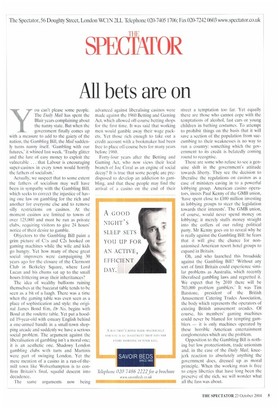SPECtATOR
All bets are on
you can't please some people. The Daily Mail has spent the Blair years complaining about the nanny state. But when the government finally comes up with a measure to add to the gaiety of the nation, the Gambling Bill, the Mail suddenly turns nanny itself. 'Gambling with our futures,' it whined last week, 'Trashy glitter and the lure of easy money to exploit the vulnerable ... that Labour is encouraging super-casinos in every town would horrify the fathers of socialism.'
Actually, we suspect that to some extent the fathers of socialism may well have been in sympathy with the Gambling Bill, which seeks to correct the injustice of having one law on gambling for the rich and another for everyone else and to remove silly restrictions on casinos. At the moment casinos are limited to towns of over 125,000 and must be run as private clubs, requiring visitors to give 24 hours' notice of their desire to gamble.
Objectors to the Gambling Bill paint a grim picture of Cis and C2s hooked on gaming machines while the wife and kids go hungry. Yet how many of these great social improvers were campaigning 30 years ago for the closure of the Clermont Club in Berkeley Square, where Lord Lucan and his chums sat up to the small hours frittering away their inheritances?
The idea of wealthy buffoons ruining themselves at the baccarat table tends to be seen as a bit of a laugh. There was a time when the gaming table was even seen as a place of sophistication and style: the original James Bond film, Dr No, begins with Bond at the roulette table. Yet put a hooded 19-year-old with estuary English behind a one-armed bandit in a small-town shopping arcade and suddenly we have a serious social problem. The argument against the liberalisation of gambling isn't a moral one; it is an aesthetic one. Shadowy London gambling clubs with tarts and Martinis were part of swinging London. Yet the mere mention of a casino in a run-of-themill town like Wolverhampton is to confirm Britain's final, squalid descent into decadence.
The same arguments now being advanced against liberalising casinos were made against the 1960 Betting and Gaming Act, which allowed off-course betting shops for the first time. It was said that working men would gamble away their wage packets, Yet those rich enough to take out a credit account with a bookmaker had been free to place off-course bets for many years before 1960.
Forty-four years after the Betting and Gaming Act, who now views their local branch of Joe Coral as an engine of social decay? It is true that sonic people are predisposed to develop an addiction to gambling, and that these people may find the arrival of a casino on the end of their
street a temptation too far. Yet equally there are those who cannot cope with the temptations of alcohol, fast cars or young children in bathing costumes. To attempt to prohibit things on the basis that it will save a section of the population from succumbing to their weaknesses is no way to run a country: something which the government to its credit is belatedly coming round to recognise.
There are some who refuse to see a genuine shift in the government's attitude towards liberty. They see the decision to liberalise the regulations on casinos as a case of ministers caving in to a powerful lobbying group. American casino operators, insists Paul Kenny of the GMB union, 'have spent close to £100 million investing in lobbying groups to steer the legislation towards their interests'. The GMB union, of course, would never spend money on lobbying; it merely stuffs money straight into the coffers of our ruling political party. Mr Kenny goes on to reveal why he is really against the Gambling Bill: he fears that it will give the chance for nonunionised American resort hotel groups to expand in Britain.
Oh, and who launched this broadside against the Gambling Bill? 'Without any sort of limit Britain could experience similar problems as Australia, which recently liberalised gambling laws and regretted it. We expect that by 2010 there will be 703,000 problem gamblers.' It was Tim Batstone, president of the British Amusement Catering Trades Association, the body which represents the operators of existing British amusement arcades. Of course, his members' gaming machines could never be blamed for tempting gamblers — it is only machines operated by these horrible American entertainment conglomerates which are the problem.
Opposition to the Gambling Bill is nothing but low protectionism, trade unionism and, in the case of the Daily Mail, kneejerk reaction to absolutely anything the government does, dressed up as moral principle. When the working man is free to enjoy liberties that have long been the preserve of the rich, we will wonder what all the fuss was about.
























































































 Previous page
Previous page